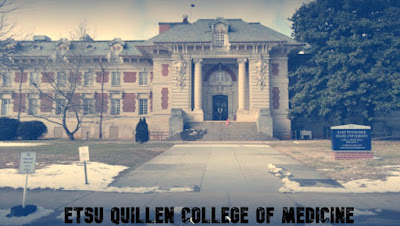Etsu Quillen College Of Medicine: Tuition and Fees, Acceptance Rate and GPA-MCAT Scores
Set at the toot of the Appalachian Mountains in northeast Tennessee, a fairly rural, lower socioeconomic area, the James H. Quillen College of Medicine has, since its founding in 1978, taken pride in producing high quality primary care physicians. Consistently more than 60 percent ot graduates choose residencies in primary care, and many of these physicians practice in a rural setting. This focused commitment has allowed Etsu Quillen College Of Medicine to become a national leader in the training ot primary care physicians, illustrated by U.S. News & World Report ranking Quillen sixth in the nation for programs in rural medicine.
The Rural Primary Care Track (RPCT) is a unique opportunity for students to be intimately involved in rural medicine throughout the four years of medical school. The W. K. Kellogg Foundation granted $6 million to Quillen for this program, of which about 15 percent of students take advantage. Still, many graduates do not choose primary care, and students are encouraged to pursue whatever field of medicine they choose.
Out of State Tuition $42,695
Program Service Fees $2,150
Health Insurance $2,800
Disability Insurance $52
Total Tuition & Fees Instate $37,800
Total Tuition & Fees Out of State $47,700
Equipment Rental Fee $350
Diagnostic Equipment $750
USMILE $490
Transportation* $3,400
Miscellaneous $2,550
Total B $8,400
Food/Household Items $3,900
Utilities/Phone $2,300
Total C $13,250
Subtotal: Instate $59,400
Subtotal: Out of State $69,250
Total Federal Loan Fees Out of State
Total Base Budget Instate $60,550
Total Base Budget Out of State $70,800
GPA 3.71
MCAT 507
Quillen College Of Medicine Tuition and Fees
COM Maintenance Fee $32,840Out of State Tuition $42,695
Program Service Fees $2,150
Health Insurance $2,800
Disability Insurance $52
Total Tuition & Fees Instate $37,800
Total Tuition & Fees Out of State $47,700
B. Indirect Costs
Books and Supplies $1,600Equipment Rental Fee $350
Diagnostic Equipment $750
USMILE $490
Transportation* $3,400
Miscellaneous $2,550
Total B $8,400
C. Room and Board
Rent** $7,200Food/Household Items $3,900
Utilities/Phone $2,300
Total C $13,250
Subtotal: Instate $59,400
Subtotal: Out of State $69,250
D. Estimated Federal Loan Fees
Total Federal Loan Fees Instate $1,200Total Federal Loan Fees Out of State
Total Base Budget Instate $60,550
Total Base Budget Out of State $70,800
East Tennessee State University - Quillen College of Medicine Average GPA and MCAT scores
GPA 3.71
MCAT 507
Acceptance Rate
%7Preclinical Years
One of the strengths of Quillen College Of Medicine is the collegial responsibility taken by each student to assist classmates. It is not uncommon for students to make copies of helpful articles or of charts they've compiled for every student, then distribute the copies anonymously ni student mailboxes.
Quillen 's schedule the first two years is traditional. Gross anatomy, biochemistry, histology, physiology, and neurology are taught the first year, while pathology, pharmacology, microbiology, and psychiatry are taught the second year. Each course holds four to five tests per semester, which are grouped in blocks of two to three days.
Grading is letter ranked, and B's are given generously. Two to four students in each class must typically repeat a year.
In general, students give high marks to gross anatomy, microbiology, and pathology because the course directors have the ability to make material relevant to patient care this in spite of the fact that many students only clinical exposure during the first two years is during Christmas break, when relatives ask them to take a look at "this funny rash." Professors and attendings are friends as well as educators and make themselves readily available at almost any hour.
Students bemoan two shortcomings in the first two years: a lack of electives and a lack of research opportunities. Although research projects are available, options are limited. Similarly, while free time should be available for electives, students are kept busy in Practicing Medicine, a course that spends many hours per week teaching skills that could be acquired in a fraction of the time.
In the summer between first and second year, students may perform research projects, mostly clinical research or epidemiology based projects. Lab work is difficult to find.
A few recent improvements include many new computers with Internet access in the student lounge, and the new medical education building scheduled for completion in the spring of 2. Both of these were sorely needed and represent the support of Quillen by the community and the state government.
The RPCT is a unique program spanning all four years. RPCT students attend didactic and clinical courses in a rural hospital and clinic one day per week for the first two years. The day RPCT students attend the clinic, traditional track students have a clinical skills course and lectures in medical specialties. During the third year, RPCT students spend four months in a rural setting and rotate in family medicine and internal medicine. While no financial benefits are offered for choosing this path, many RPCT students sign contracts with local hospitals to pay back one year of postresidency service for one year's tuition.
Surgery is one of the better rotations. Pediatrics and family medicine also are well organized. The weakest rotation is obstetrics and gynecology, where students have chronically complained of subpar teaching and organization. Psychiatry also leaves something to be desired. In both of these rotations, students spend varying amounts of time in different hospitals, which alters experiences.
Living in the midst of miles of natural beauty makes for a limited nightlife. While bars and clubs exist, many nights are spent at individuals parties. The area is quite homogeneous, with the population made up of mostly white Protestants.
Web https://www.etsu.edu/com/
Quillen 's schedule the first two years is traditional. Gross anatomy, biochemistry, histology, physiology, and neurology are taught the first year, while pathology, pharmacology, microbiology, and psychiatry are taught the second year. Each course holds four to five tests per semester, which are grouped in blocks of two to three days.
Grading is letter ranked, and B's are given generously. Two to four students in each class must typically repeat a year.
In general, students give high marks to gross anatomy, microbiology, and pathology because the course directors have the ability to make material relevant to patient care this in spite of the fact that many students only clinical exposure during the first two years is during Christmas break, when relatives ask them to take a look at "this funny rash." Professors and attendings are friends as well as educators and make themselves readily available at almost any hour.
Students bemoan two shortcomings in the first two years: a lack of electives and a lack of research opportunities. Although research projects are available, options are limited. Similarly, while free time should be available for electives, students are kept busy in Practicing Medicine, a course that spends many hours per week teaching skills that could be acquired in a fraction of the time.
In the summer between first and second year, students may perform research projects, mostly clinical research or epidemiology based projects. Lab work is difficult to find.
A few recent improvements include many new computers with Internet access in the student lounge, and the new medical education building scheduled for completion in the spring of 2. Both of these were sorely needed and represent the support of Quillen by the community and the state government.
The RPCT is a unique program spanning all four years. RPCT students attend didactic and clinical courses in a rural hospital and clinic one day per week for the first two years. The day RPCT students attend the clinic, traditional track students have a clinical skills course and lectures in medical specialties. During the third year, RPCT students spend four months in a rural setting and rotate in family medicine and internal medicine. While no financial benefits are offered for choosing this path, many RPCT students sign contracts with local hospitals to pay back one year of postresidency service for one year's tuition.
Clinical Years
With a formal affiliation with five area teaching hospitals that provide access to more than 2,300 patient beds, students are afforded a great deal of patient contact. Residents or attendings are on hand to provide guidance and to educate, sometimes resulting in minimal individual initiative. One exception is the Mountain Home Veterans Affairs Hospital, in the middle of Johnson City. Students are treated with respect and trust by an excellent faculty that is dedicated to education.Surgery is one of the better rotations. Pediatrics and family medicine also are well organized. The weakest rotation is obstetrics and gynecology, where students have chronically complained of subpar teaching and organization. Psychiatry also leaves something to be desired. In both of these rotations, students spend varying amounts of time in different hospitals, which alters experiences.
Social Life
The population of Johnson City, located at the base of Great Smoky Mountains National Park, is 55,000, although two other cities are within 20 miles, bringing the nearby population to 450,000. Because of the great natural beauty surrounding this area, outdoor activities abound. Several state parks, including the Blue Ridge Parkway, and five Tennessee Valley Authority lakes provide spectacular mountain biking, hiking, fishing, snow skiing and waterskiing, sailing, and world class white water rafting and kayaking.Real Estate Program
Housing is very affordable. A one bedroom apartment runs about $550 to $750 per month. Many students choose to buy a condominium; a new two bedroom is about $120,000. Housing close to the hospital and the school is readily available. All housing options have a wonderful view of the surrounding mountains as well.Living in the midst of miles of natural beauty makes for a limited nightlife. While bars and clubs exist, many nights are spent at individuals parties. The area is quite homogeneous, with the population made up of mostly white Protestants.
Dr. Block Quillen Graduate Medical Education Overview
Final Thoughts
The James H. Quillen College of Medicine, while weak in a few areas, provides a high quality medical education in a nurturing environment.Web https://www.etsu.edu/com/



















Comments
Post a Comment